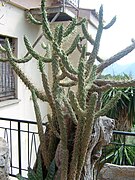Austrocylindropuntia cylindrica
Appearance
| Austrocylindropuntia cylindrica | |
|---|---|

| |
| Growth form of a large individual | |

| |
| Botanical illustration | |
| Scientific classification | |
| Kingdom: | Plantae |
| Clade: | Tracheophytes |
| Clade: | Angiosperms |
| Clade: | Eudicots |
| Order: | Caryophyllales |
| Family: | Cactaceae |
| Genus: | Austrocylindropuntia |
| Species: | A. cylindrica
|
| Binomial name | |
| Austrocylindropuntia cylindrica | |
| Synonyms[1] | |
|
List
| |
Austrocylindropuntia cylindrica (syn. Opuntia cylindrica), the cane cactus, is a species of flowering plant in the family Cactaceae. It is native to Colombia, Ecuador, and Peru, and it has been introduced to the Canary Islands, Morocco, Eritrea, Ethiopia, South Africa, Australia, and New Zealand.[1] A popular ornamental, it is an invasive species in Europe, South Africa, and Australia.[2] Due to a misidentification, for a time this species was erroneously thought to contain mescaline.[3]
-
In bloom at the Madeira Botanical Garden
-
On Mallorca
-
Cristate individual
-
Another cristate individual
References
[edit]- ^ a b "Austrocylindropuntia cylindrica (Lam.) Backeb". Plants of the World Online. Royal Botanic Gardens, Kew. Retrieved 29 May 2022.
- ^ "Datasheet Austrocylindropuntia cylindrica (cane cactus)". Invasive Species Compendium. CAB International. 2022. Retrieved 29 May 2022.
...Common Names ...coral cactus
- ^ Iversen, Leslie (6 December 2012). Stimulants. p. 260-261. ISBN 9781475705102.





